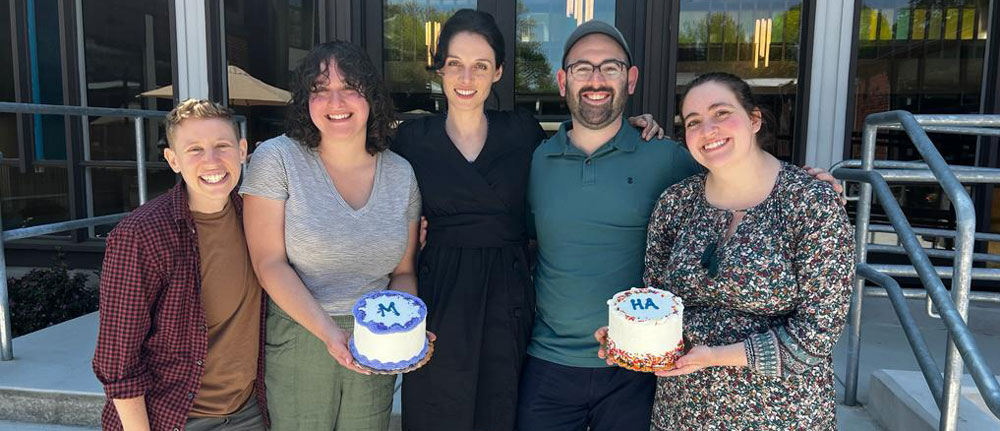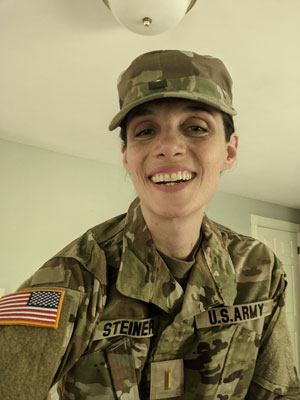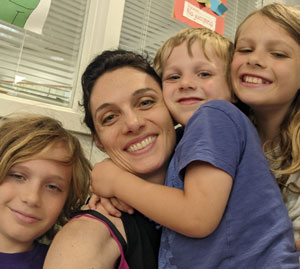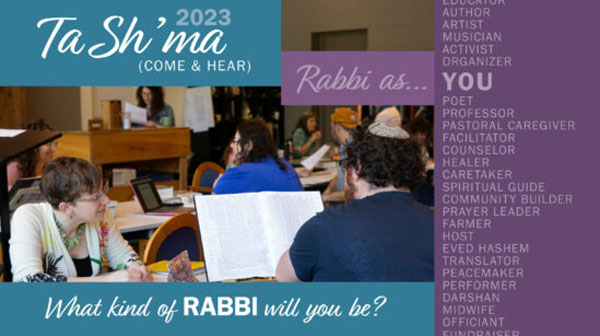Community Blog A Ministry of Presence: Hebrew College Rabbinical Student Serves as Army Chaplain

 Hebrew College rabbinical student Monica Steiner was in high school in Monterey, CA on September 11, 2001. “I had friends in the military,”says Steiner, “and I witnessed first-hand the unique spiritual questions they grappled with during their service and beyond. At 18 or 19, I was in college and had an amazing rabbi at Hillel to turn to with my own questions; my friends who were in the military were lucky if they had a chaplain. Jewish chaplains are even rarer. And female Jewish ones? Very uncommon.” (Pictured top: Monica with her Hebrew College Rabbinical School cohort and right in her chaplain uniform.)
Hebrew College rabbinical student Monica Steiner was in high school in Monterey, CA on September 11, 2001. “I had friends in the military,”says Steiner, “and I witnessed first-hand the unique spiritual questions they grappled with during their service and beyond. At 18 or 19, I was in college and had an amazing rabbi at Hillel to turn to with my own questions; my friends who were in the military were lucky if they had a chaplain. Jewish chaplains are even rarer. And female Jewish ones? Very uncommon.” (Pictured top: Monica with her Hebrew College Rabbinical School cohort and right in her chaplain uniform.)
Steiner points to that experience when asked why she was drawn to serve as a Chaplain in the Massachusetts Army National Guard. “This is a sorely needed area of spiritual service, and I am honored to be able to step in and do it,” she said. Steiner wants to serve as a congregational rabbi upon ordination, “being a chaplain in the Guard means I can do both.”
Steiner was commissioned this past year during her first year in rabbinical school through the Chaplain Candidate Program, which allows her to serve as a student rabbi while working towards ordination. She has learned from her superiors in the Army that this work is a “ministry of presence.” This means that Chaplains train with their soldiers and are present during their drills and work. “We develop relationships and trust so that when something happens, the soldiers feel comfortable coming to us for support. Chaplains offer clerical confidentiality and a human connection to soldiers and their families,” added Steiner. “They also offer opportunities for worship and ritual celebration.”
“I like to joke that I’m in it for the cute outfit,” quipped Steiner. “I think that the more serious our work is, the more of a sense of playfulness and relaxed focus we do well to cultivate in it… When I’m at my best, I can maintain connection in the highest stakes moments between myself and the people I’m serving. We walk these moments together.”
This is what the rabbinate is all about for Steiner. “This is important to me: I’ve done wonderful things in my life and also made big mistakes and hurt people I love deeply. This is what it is to be human. And what we support others in as rabbis. That’s true whether in the civilian or military context,” she said. National Guard chaplaincy also has the benefit of being part time.
For those that know Steiner, it may come as a surprise to hear she’s in the Army, but it comes as no surprise that she is serving those in need.
“Monica is a passionate and compassionate person. She listens with her whole being and responds to people and the world with joy, care, love, and concern. We are very grateful to Monica and proud of her that she has chosen the incredibly important and noble work of military chaplaincy,” said Hebrew College Dean of Students Rabbi Daniel Klein. “We need more people to care for the hearts and souls of the brave people serving in the military, and we desperately need people with Monica’s gifts and talents to do so.”
Chaplaincy has some unexpected benefits, too. “Every drill weekend kills my ego and let’s in the humility I need,” Steiner explains with a self-deprecating smile. “Hourly, I admit (often several times per conversation) how much I do not know.” Remembering and adjusting to the use of military titles and acronyms are one small example of this humility reminder: “they’re still so new to me that I have to ask everybody what I’m supposed to call them. I have to ask, ‘do I call you sir?’ and they give me a little lesson, and we laugh…and there’s a new relationship, and I’m doing my job.”
To any Jewish leaders and rabbis considering military chaplaincy, Steiner says: “You might not think of yourself as someone who would join the military—anyone who knows me giggles at the idea that I’m a solider. But it’s possible to become something you’ve never expected,” she said. “Our soldiers need rabbis.”
Hebrew College embraces and welcomes a robust and inclusive vision for the rabbinate, but Steiner’s service is a new milestone. She is the first Hebrew College rabbinic student to serve in the Chaplain Candidate program; and her mentors in the Guard confirm that she is also the first female Jewish chaplain in Massachusetts state history. 
“The world is just not set up for women to do and be as much as men… And while I am powerless over that reality, I do get to choose how I respond to it. I have long had to remind myself not to accept the premise that, as a mother, my own existence in the world is at zero-sum odds with my children’s well-being,” says Steiner. “It’s really hard. It just is. But the propulsion of my inner calling is stronger than that. And in everything I do, my community is with me.”(Right: Monica with her kids)
Learn more about Hebrew College’s Rabbinical School and our upcoming ordination open house, Ta Sh’ma (Come & Hear) on Nov. 13 (in –person) and Nov 19 (online).


